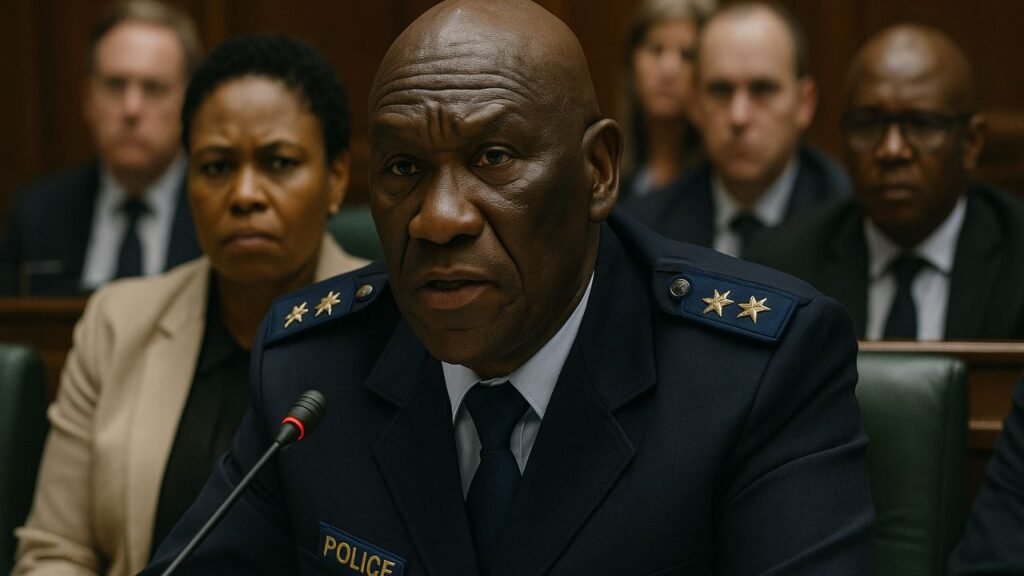Top police official testifies – South Africa has once again found itself in the spotlight as a top police official revealed shocking details about the extent of criminal syndicate infiltration in state institutions. During a high-profile testimony, the official explained how organized crime networks have gradually penetrated key sectors, including law enforcement, border control, and financial systems. According to investigative reports by Daily Maverick, criminal groups have been exploiting corruption and weak oversight, creating parallel systems of power that threaten national security. This testimony has sparked widespread debate across the country, with experts warning that unless immediate reforms are implemented, the foundations of South Africa’s justice system could be irreparably compromised. For ordinary citizens, this raises pressing concerns about safety, fairness, and accountability, especially as these syndicates continue to profit from illegal trade, smuggling, and violent crime.

How Criminal Syndicates Infiltrated State Institutions
The testimony highlighted disturbing evidence of how syndicates infiltrated South Africa’s public sector by leveraging corruption, bribery, and intimidation. Reports from News24 have shown that criminal groups often target vulnerable officials with financial incentives, ensuring cooperation in smuggling operations, drug trafficking, and even money laundering. Once inside, these syndicates manipulate systems to protect their networks, evade prosecution, and extend influence over critical operations. The police official stressed that certain government departments are at risk of becoming compromised to such an extent that citizens no longer trust public institutions. The problem is not confined to the police force; it stretches into immigration offices, licensing departments, and customs checkpoints, making it a nationwide issue. Such systemic infiltration threatens the integrity of the state and calls for urgent intervention.
The Role of Corruption in Undermining National Security
Corruption has played a central role in enabling these criminal syndicates to operate freely. According to findings published by Corruption Watch, officials at various levels of government have facilitated illegal activities in exchange for bribes. This has not only weakened law enforcement but also eroded public confidence in South Africa’s ability to maintain order and uphold justice. The police official’s testimony revealed how syndicates use corrupt relationships to smuggle drugs, firearms, and counterfeit goods across borders with minimal resistance. Furthermore, corruption allows high-ranking individuals to obstruct investigations and protect those involved in organized crime. This vicious cycle undermines national security, allowing crime to flourish while honest citizens bear the consequences. The ongoing infiltration shows that without addressing corruption at its roots, syndicate operations will continue to expand unchecked.
Impact on Communities and Everyday Citizens
The infiltration of criminal syndicates has had devastating consequences for South African communities. Citizens are increasingly vulnerable to violent crimes, drug abuse, and gang activity that syndicates fuel across major cities. Reports from Sowetan Live highlight how ordinary people pay the price through rising insecurity, higher crime rates, and reduced trust in law enforcement. Local businesses also suffer as extortion and smuggling drive legitimate competition out of the market. In rural areas, syndicate operations often involve illegal mining and wildlife trafficking, stripping communities of natural resources and economic opportunities. For many South Africans, the testimony confirms long-standing fears that organized crime has become embedded in the social fabric. Without decisive reforms, citizens may continue to live under the shadow of syndicate-driven violence and corruption.
Proposed Solutions and the Way Forward
The testimony has prompted calls for urgent reforms to restore public confidence and dismantle syndicate influence. According to an analysis by The Conversation, strategies must include strengthening oversight mechanisms, increasing transparency, and investing in independent anti-corruption units. The police official emphasized the importance of international cooperation, as many syndicates operate across borders, linking South Africa to global crime networks. Experts also recommend improved witness protection programs and harsher penalties for officials found colluding with criminal groups. Additionally, civil society organizations are urging the government to adopt community-led initiatives that empower citizens to hold institutions accountable. While the road ahead is challenging, addressing criminal infiltration is critical for safeguarding democracy, ensuring justice, and protecting South Africa’s long-term stability. If bold measures are taken now, there is still hope to reclaim public institutions from the grip of syndicates.







